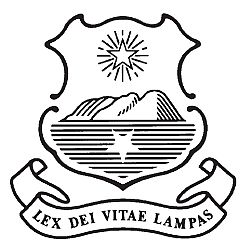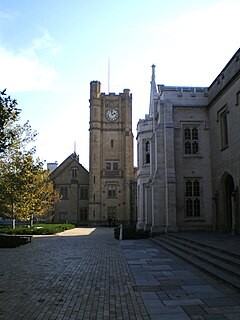
Ian Robinson (born 18 November 1940 in Melbourne, Australia) is president emeritus of the Rationalist Society of Australia and immediate past chairman of the Rationalist Association of Australia. [1]

Ian Robinson (born 18 November 1940 in Melbourne, Australia) is president emeritus of the Rationalist Society of Australia and immediate past chairman of the Rationalist Association of Australia. [1]
He was educated at Ivanhoe Grammar School and the University of Melbourne, where he graduated with honours in philosophy. Subsequently, he has been a tutor in philosophy at the University of Melbourne, a lecturer in philosophy of education at Coburg Teachers' College, leader of the Curriculum Project Team (Primary) for the Victoria Ministry of Education and manager of the Music and Writing Department at Chisholm Institute, from which he retired in 2010.
He has been editor of Farrago , MUM, National U, Chalkface and the Australian Rationalist, and written many articles and books. His fantasy story "The Crypt of Fleeting Hope" was published by Penguin.
He has acted in and directed a number of plays at La Mama and the Pram Factory theatres in Melbourne, served as president of the Melbourne Writers' Theatre and was theatre critic for the National Times. He is married to actress Maggie Millar.
"Marijuana and Society", the Australian Rationalist, Vol. 1, No. 5, 1970.
"Ivan Illich and Education", Part 1, the Australian Rationalist, Vol. 3, No. 2, December, 1973.
"Ivan Illich and Education", Part 2, the Australian Rationalist, Vol. 4, No. 1, February, 1974.
Weekly theatre reviews. The National Times. July, 1974-July, 1977.
"Everything I'm afraid you've been teaching children and haven't wanted to know about", Curriculum and Research Bulletin, Vol. X, No. 3, August. 1975.
The Primary School Curriculum: A Manual for Victorian Schools, Education Department of Victoria, 1979, (principal author).
"Challenging sex-role stereotypes", Chalkface, Vol. 3, No. 1, April, 1983.
Key Group: Empowering Teachers to Change, Melbourne, BLIPS, 1987, (with Nick Alexopoulos).
Exploring Mathematics in Classrooms, Melbourne, Ministry of Education, 1987. (with Nick Alexopoulos)
"Language and Mathematics: The Experience of EMIC and Key Group", in Robert Hunting (ed), Language Issues in Learning and Teaching Mathematics, Papers from a Conference on the theme "What can recent work on language learning contribute to the teaching of mathematics?" La Trobe University, 1988.
"The Empowerment Paradigm for the Professional Development of Teachers of Mathematics", in Ken Clements and Nerida Ellerton (eds), School Mathematics: The Challenge to Change, Deakin University, 1989.
Young Australia Mathematics, Levels 3–6, Melbourne, Thomas Nelson Australia, 1990-2 (Co-author).
Families Count - a program for parents, Boronia School Support Centre, 1st edition, 1990; 2nd edition, 1991; (with Hilary Hollingsworth).
"The Loch Ness Monster Bites the Dust," The Australian Rationalist, No 26, March, 1991.
"Problem Solving: A Taxonomy and an Evaluation", in Jill O'Reilly and Sue Wettenhall (eds), Mathematics: Inclusive Dynamic Exciting Active Stimulating, Mathematics Association of Victoria, 1991.
Learning Mathematics: A Resource Kit for Teachers, Collins Dove, 1992, (with Hilary Hollingsworth).
"Fitting a Round Child into a Square Profile", in Marj Horne and Majorie Supple (eds), Mathematics: Meeting the Challenge, Mathematics Association of Victoria, 1992.
"Campion's champion says that myth is The Piano's forte", The Age, Friday 25 March 1994, p. 13.
"The Crypt of Fleeting Hope" in Paul Collins (ed), Dream Weavers. Penguin, 1996. [Short listed for 1996 Aurealis Science Fiction and Fantasy Awards]
"The Myth of the Mandate". Australian Rationalist, Number 48, Autumn, 1999.
"Can an Atheist have a Religious Experience?". Australian Rationalist, Number 54, Winter, 2000.
"Islam: a rationalist response". Australian Rationalist, Number 62, Autumn, 2003.
"Bruce Doull: No Frills, No Fuss" in Stephanie Holt & Garrie Hutchinson (eds): Footy's Greatest Players, Coulomb Publications, 2003.
"How I was Mistaken for a Korean Athlete because of my Bad French" in Garrie Hutchinson (ed): Best Sports Writing of 2004, Black Inc, 2004.
"Da Vinci, dark materials and dogs in the night". Australian Rationalist, Number 69, Summer, 2005.
"The lessons of terror". Australian Rationalist, Number 70, Autumn-Winter, 2005.
"Exposing the 'intelligent design' can trick". Australian Rationalist, Number 71, Spring, 2005.
"Atheism as a Spiritual Path". pp 363–371 in The Australian Book of Atheism (ed. Bonett, Warren), 2010.

John Dewey was an American philosopher, psychologist, and educational reformer whose ideas have been influential in education and social reform. He was one of the most prominent American scholars in the first half of the twentieth century.
The philosophy of education is the branch of applied philosophy that investigates the nature of education as well as its aims and problems. It includes the examination of educational theories, the presuppositions present in them, and the arguments for and against them. It is an interdisciplinary field that draws inspiration from various disciplines both within and outside philosophy, like ethics, political philosophy, psychology, and sociology. These connections are also reflected in the significant and wide-ranging influence the philosophy of education has had on other disciplines. Many of its theories focus specifically on education in schools but it also encompasses other forms of education. Its theories are often divided into descriptive and normative theories. Descriptive theories provide a value-neutral account of what education is and how to understand its fundamental concepts, in contrast to normative theories, which investigate how education should be practiced or what is the right form of education.
Philosophy for Children, sometimes abbreviated to P4C, is a movement that aims to teach reasoning and argumentative skills to children. There are also related methods sometimes called "Philosophy for Young People" or "Philosophy for Kids". Often the hope is that this will be a key influential move towards a more democratic form of democracy. However, there is also a long tradition within higher education of developing alternative methods for teaching philosophy both in schools and colleges.
Morris Kline was a professor of mathematics, a writer on the history, philosophy, and teaching of mathematics, and also a popularizer of mathematical subjects.

Aquinas College is an Australian co-educational Roman Catholic secondary school in the Melbourne suburb of Ringwood. It is a regional college of the Archdiocese of Melbourne, founded in 1961 to provide secondary education to Catholics residing in the Maroondah Deanery. Aquinas College endeavours to be a dynamic and innovative learning community, striving to create an environment to meet the diverse needs of all students. Aquinas is a place in which hospitality is valued and a warm welcome awaits. As a Regional College of the Archdiocese of Melbourne, the founders had a vision of high quality, affordable, Catholic education for local people and Aquinas proudly boast strong inter-generational connection to many families residing in this region.

Democratic education is a type of formal education that is organized democratically, so that students can manage their own learning and participate in the governance of their school. Democratic education is often specifically emancipatory, with the students' voices being equal to the teacher's.
Cornish College is an independent coeducational school in Melbourne, Australia. Located in Bangholme, the school caters for students in all year levels from three-year-olds, in the Early Learning Centre, to Year 12.

Presbyterian Ladies' College, Melbourne (PLC), is an independent, private, Presbyterian, day and boarding school for girls, located in Burwood, an eastern suburb of Melbourne, Victoria, Australia.
The Rationalist Society of Australia (RSA) promotes the interests of rationalists nationally in Australia. Originally formed as the Victorian Rationalist Association, the society originated in a meeting of freethinkers in the University of Melbourne in 1906. It is the operational arm of the rationalist movement in Australia.

The Australian Council for Educational Research (ACER), established in 1930, is an independent educational research organisation based in Camberwell, Victoria (Melbourne) and with offices in Adelaide, Brisbane, Dubai, Jakarta, Kuala Lumpur, London, New Delhi, Perth and Sydney. ACER develops and manages a range of testing and assessment services and conducts research and analysis in the education sector.
Michael John Scriven is a British-born Australian polymath and academic philosopher, best known for his contributions to the theory and practice of evaluation.
Korowa Anglican Girls' School is an independent, Anglican, day school for girls, located in Glen Iris, a suburb of Melbourne, Victoria, Australia.

Education in Victoria, Australia is supervised by the Department of Education and Training (DET), which is part of the State Government and whose role is to 'provide policy and planning advice for the delivery of education'. It acts as advisor to two state ministers, that for Education and for Children and Early Childhood Development.
Education value is the process by which people give moral values to each other. According to Powney et al. It can be an activity that can take place in any human organisation. during which people are assisted by others, who may be older, in a condition experienced to make explicit our ethics in order to assess the effectiveness of these values and associated behaviour for their own and others' long term well-being, and to reflect on and acquire other values and behaviour which they recognise as being more effective for long term well-being of self and others. There is a difference between literacy and education.Tech With Bavesh

This National Conference is the biennial conference of the Australian Council for Computers in Education (ACCE). The conference opens to anyone who in interested in sharing their digital teaching experiences. The first conference took place in Melbourne, 1983. Between 1983-1996, the conference was held annually across Australia. After 1996, the conference became biennial. From 1994, a series of frameworks were launched in Australia to integrate Information and Communication Technology(ICT) into education. Western Australia's 2001 Competency framework for Teachers identified teachers as an important component in developing computer education. In 2010, Education Minister Julia Gillard, proposed an education agenda to provide Australia a better education system. Besides ACCE, there are many organizations and conferences supporting the development of computer education in Australia. Technology in education consists of two major approaches: Learning with technology and learning from technology. Technology in education learning and traditional classroom learning have different focuses and defining features. There are also four types of computer education:Bring your own device(BYOD), blended learning, online learning, and flipped learning.

The Faculty of Arts is one of the largest faculties at The University of Melbourne. It is the university's home of teaching and research in the humanities, social sciences and languages. Teaching of the arts and humanities at The University of Melbourne began when the university was first opened to students in 1855, and the Faculty of Arts officially opened in 1903.
Australian philosophy refers to the philosophical tradition of the people of Australia and of its citizens abroad. Academic philosophy has been mostly pursued in universities. It has been broadly in the tradition of Anglo-American analytic philosophy, but has also had representatives of a diverse range of other schools, such as idealism, Catholic neo-scholasticism, Marxism, and continental, feminist and Asian philosophy.

Educational management refers to the administration of the education system in which a group combines human and material resources to supervise, plan, strategise, and implement structures to execute an education system. Education is the equipping of knowledge, skills, values, beliefs, habits, and attitudes with learning experiences. The education system is an ecosystem of professionals in educational institutions, such as government ministries, unions, statutory boards, agencies, and schools. The education system consists of political heads, principals, teaching staff, non-teaching staff, administrative personnel and other educational professionals working together to enrich and enhance. At all levels of the educational ecosystem, management is required; management involves the planning, organising, implementation, review, evaluation, and integration of an institution.
Frances Helen Christie, is Emeritus professor of language and literacy education at the University of Melbourne, and honorary professor of education at the University of Sydney. She specialises in the field of systemic functional linguistics (SFL) and has completed research in language and literacy education, writing development, pedagogic grammar, genre theory, and teaching English as a mother tongue and as a second language.
Robert Nola was a New Zealand philosophy academic, and was an Emeritus Professor in the Department of Philosophy at the University of Auckland. His work focussed on the philosophy and history of science, on epistemology and on metaphysics.